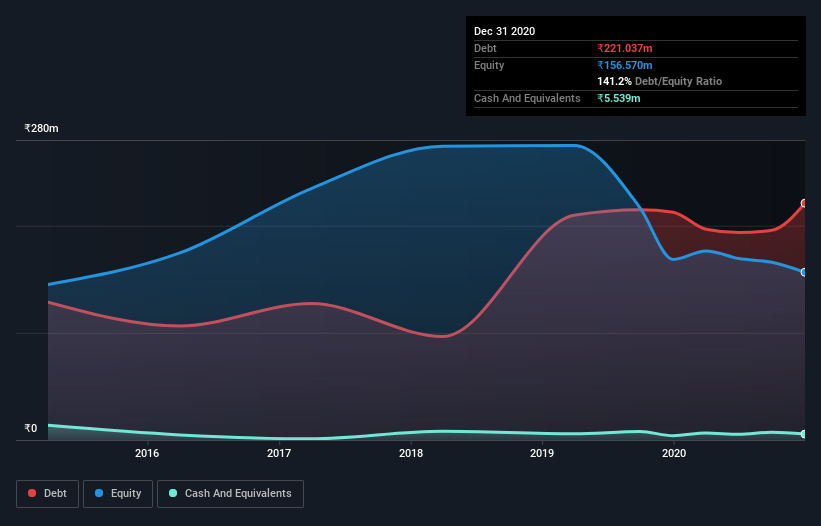Is Vadivarhe Speciality Chemicals (NSE:VSCL) Using Too Much Debt?
David Iben put it well when he said, 'Volatility is not a risk we care about. What we care about is avoiding the permanent loss of capital.' When we think about how risky a company is, we always like to look at its use of debt, since debt overload can lead to ruin. We note that Vadivarhe Speciality Chemicals Limited (NSE:VSCL) does have debt on its balance sheet. But is this debt a concern to shareholders?
When Is Debt A Problem?
Debt and other liabilities become risky for a business when it cannot easily fulfill those obligations, either with free cash flow or by raising capital at an attractive price. If things get really bad, the lenders can take control of the business. However, a more common (but still painful) scenario is that it has to raise new equity capital at a low price, thus permanently diluting shareholders. Having said that, the most common situation is where a company manages its debt reasonably well - and to its own advantage. When we think about a company's use of debt, we first look at cash and debt together.
View our latest analysis for Vadivarhe Speciality Chemicals
How Much Debt Does Vadivarhe Speciality Chemicals Carry?
As you can see below, Vadivarhe Speciality Chemicals had ₹221.0m of debt, at December 2020, which is about the same as the year before. You can click the chart for greater detail. However, because it has a cash reserve of ₹5.54m, its net debt is less, at about ₹215.5m.

How Strong Is Vadivarhe Speciality Chemicals' Balance Sheet?
We can see from the most recent balance sheet that Vadivarhe Speciality Chemicals had liabilities of ₹155.6m falling due within a year, and liabilities of ₹144.4m due beyond that. Offsetting these obligations, it had cash of ₹5.54m as well as receivables valued at ₹106.0m due within 12 months. So its liabilities total ₹188.6m more than the combination of its cash and short-term receivables.
This deficit is considerable relative to its market capitalization of ₹212.2m, so it does suggest shareholders should keep an eye on Vadivarhe Speciality Chemicals' use of debt. This suggests shareholders would be heavily diluted if the company needed to shore up its balance sheet in a hurry. The balance sheet is clearly the area to focus on when you are analysing debt. But it is Vadivarhe Speciality Chemicals's earnings that will influence how the balance sheet holds up in the future. So if you're keen to discover more about its earnings, it might be worth checking out this graph of its long term earnings trend.
Over 12 months, Vadivarhe Speciality Chemicals made a loss at the EBIT level, and saw its revenue drop to ₹254m, which is a fall of 12%. That's not what we would hope to see.
Caveat Emptor
While Vadivarhe Speciality Chemicals's falling revenue is about as heartwarming as a wet blanket, arguably its earnings before interest and tax (EBIT) loss is even less appealing. Indeed, it lost a very considerable ₹31m at the EBIT level. Considering that alongside the liabilities mentioned above does not give us much confidence that company should be using so much debt. Quite frankly we think the balance sheet is far from match-fit, although it could be improved with time. However, it doesn't help that it burned through ₹11m of cash over the last year. So suffice it to say we consider the stock very risky. When analysing debt levels, the balance sheet is the obvious place to start. But ultimately, every company can contain risks that exist outside of the balance sheet. Case in point: We've spotted 4 warning signs for Vadivarhe Speciality Chemicals you should be aware of, and 3 of them shouldn't be ignored.
When all is said and done, sometimes its easier to focus on companies that don't even need debt. Readers can access a list of growth stocks with zero net debt 100% free, right now.
If you decide to trade Vadivarhe Speciality Chemicals, use the lowest-cost* platform that is rated #1 Overall by Barron’s, Interactive Brokers. Trade stocks, options, futures, forex, bonds and funds on 135 markets, all from a single integrated account. Promoted
New: Manage All Your Stock Portfolios in One Place
We've created the ultimate portfolio companion for stock investors, and it's free.
• Connect an unlimited number of Portfolios and see your total in one currency
• Be alerted to new Warning Signs or Risks via email or mobile
• Track the Fair Value of your stocks
This article by Simply Wall St is general in nature. It does not constitute a recommendation to buy or sell any stock, and does not take account of your objectives, or your financial situation. We aim to bring you long-term focused analysis driven by fundamental data. Note that our analysis may not factor in the latest price-sensitive company announcements or qualitative material. Simply Wall St has no position in any stocks mentioned.
*Interactive Brokers Rated Lowest Cost Broker by StockBrokers.com Annual Online Review 2020
Have feedback on this article? Concerned about the content? Get in touch with us directly. Alternatively, email editorial-team (at) simplywallst.com.
About NSEI:VSCL
Vadivarhe Speciality Chemicals
Manufactures and sells organic chemicals, intermediates, active pharmaceutical ingredients (APIs), personal care products, and specialty chemicals in India and internationally.
Moderate risk and overvalued.
Market Insights
Community Narratives



